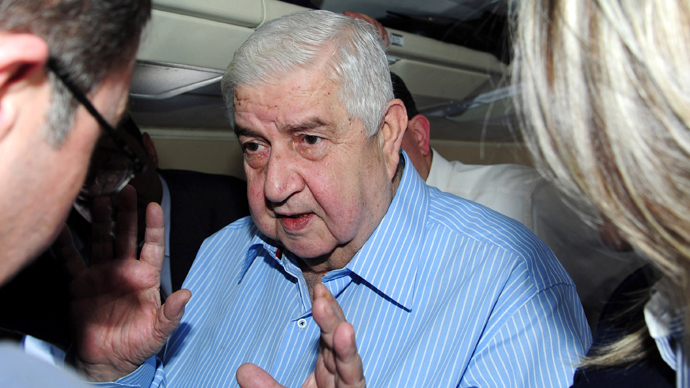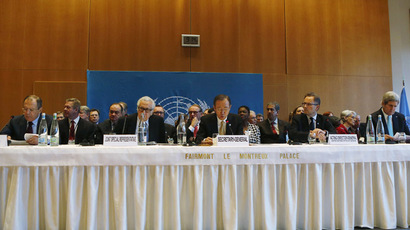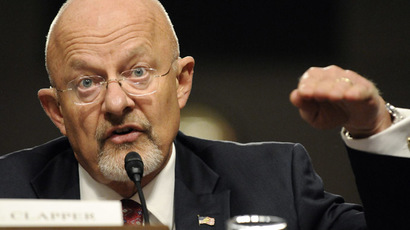‘No direct US-Syria talks unless Kerry apologizes’ – Syrian FM

The Syrian FM claims to have rejected a US offer of direct talks without the involvement of the opposition "tools" during the Geneva conference over John Kerry’s refusal to apologize for his biased speech. US officials denied seeking such a meeting.
On his way back to Syria, the country’s foreign minister Walid
Muallem was asked why hadn’t the Damascus delegation spoken
directly with the US without intermediaries from the opposition
delegation.
“Frankly, the Americans have asked for that in Montruex and I
refused unless Kerry apologizes for the speech he made in the
conference,” Walid Muallem told Syrian state media on board
a plane bound for Damascus.
Syria's foreign minister was apparently referring to the opening
remarks of US Secretary of State John Kerry’s speech made in
Montreux, Switzerland on January 22, who said that President Bashar Assad lost all legitimacy
and cannot be a part of any transitional government.
“There is no way, not possible in the imagination, that the
man who has led the brutal response to his own people could
regain legitimacy to govern,” Kerry said in that speech.
Walid Muallem rebuffed him at the time, saying no outside force
had the right to “withdraw legitimacy” from the
president or government except for the people of the country.
The US officials were quick to deny claims by Syria's foreign
minister that US diplomats were seeking direct negotiation with
the Syrian delegation.
“At no point did the United States offer to negotiate
directly with the Syrian regime,” State Department
spokeswoman Jen Psaki said, though clarifying that the US indeed
offered to connect with Syrian officials “on a staff
level” through the United Nations and Joint Special
Representative Lakhdar Brahimi.
Psaki added that the State Department will never apologize for
the views expressed by the top US diplomat. “At no point will
Secretary Kerry ever apologize for speaking the truth about the
brutality the Assad regime has inflicted on the people of
Syria,” she said.

Syrian political activist Ammar Waqqaf told RT that he believes
the US government is not going to apologize.
“No, not at all,” Waqqaf stated when asked whether the
US would be willing to express its apologies. “We also need
to take into consideration that the US Congress has voted during
the negotiations to arm the rebels. So there is a lot to answer
for. And [given] the language we are hearing from the Americans,
they don’t seem to be having any shame about it,” he said.
The peace talks that ended in Geneva on Friday producing no
concrete results and no official commitment from Damascus
delegation to return to the negotiation table on February 10. The
government and opposition were unable to bridge their differences
on ceasefires, humanitarian corridors or the question of a
transitional governing body.
In a security conference in Munich, the UN Secretary-General Ban
Ki-moon said that he urged Russian Foreign Minister Sergey Lavrov
and US Secretary of State John Kerry “to use their influence
to ensure the talks proceed as scheduled on February 10.”
Lavrov insisted that “Russia can do nothing alone” as he
asked the US to apply their influence on the Syrian opposition.
Muallem, meanwhile, warned the opposition will eventually suffer
a “reality shock” unless they abandon their
“illusions” and drop unrealistic demands.
The Assad delegation has sought to focus the discussions on
brutal acts of terrorism, and Muallem accused the opposition
delegation for refusing to sign a declaration condemning such
activity in Syria.
“This rejection is a smirch on the forehead of the coalition's
delegation, and as I said yesterday that any person in the world
who suffered from terrorism would adopt this draft
statement,” Muallem said, adding that the foreign-based
coalition who “live in 5-star hotels” knowing nothing
about the Syrian reality.
The Syrian foreign minister also lashed out against the
“unjust” international community that impose sanctions
on a war-torn country.
“It is an ‘international community’ that adopts double
standards policy and mostly dominated by the US… they dominate
the UN Security Council and the UN,” Muallem said.
“When they say ‘international community’ we laugh as they do not
represent the international community, for if we take into
consideration the population of Russia, China, India and the
BRICS countries, we find that they are the international
community.”
Muallem questioned how could the West want to be involved Geneva
dialogue and at the same time “impose sanctions on the Syrian
people and children?” He asked European Union's foreign
policy chief, Catherine Ashton to explain how can the West can
sanction a ban on food products yet at the same time discuss the
issue of humanitarian aid shipments.
The foreign minister concluded by saying that in the negation
process, Syria will refuse anything that contradicts the
constitution.
“This constitution was reached by a referendum and no one can
reach or even think that the presidency is a topic of
discussion.”














